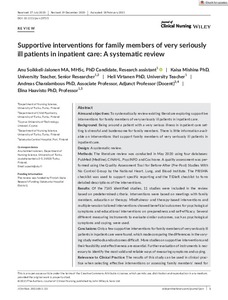Supportive interventions for family members of very seriously ill patients in inpatient care: A systematic review
Soikkeli-Jalonen Anu; Mishina Kaisa; Virtanen Heli; Charalambous Andreas; Haavisto Elina
Supportive interventions for family members of very seriously ill patients in inpatient care: A systematic review
Soikkeli-Jalonen Anu
Mishina Kaisa
Virtanen Heli
Charalambous Andreas
Haavisto Elina
WILEY
Julkaisun pysyvä osoite on:
https://urn.fi/URN:NBN:fi-fe2021050328592
https://urn.fi/URN:NBN:fi-fe2021050328592
Tiivistelmä
Aims and objectives To systematically review existing literature exploring supportive interventions for family members of very seriously ill patients in inpatient care.
Background Being around a patient with a very serious illness in inpatient care setting is stressful and burdensome for family members. There is little information available on interventions that support family members of very seriously ill patients in inpatient care.
Design A systematic review.
Methods The literature review was conducted in May 2020 using four databases: PubMed (Medline), CINAHL, PsycINFO and Cochrane. A quality assessment was performed using the Quality Assessment Tool for Before-After (Pre-Post) Studies With No Control Group by the National Heart, Lung, and Blood Institute. The PRISMA checklist was used to support specific reporting and the TIDieR checklist to form detailed descriptions of the interventions.
Results Of the 7165 identified studies, 11 studies were included in the review based on predetermined criteria. Interventions were based on meetings with family members, education or therapy. Mindfulness- and therapy-based interventions and multiple-session tailored interventions showed beneficial outcomes for psychological symptoms and educational interventions on preparedness and self-efficacy. Several different measuring instruments to evaluate similar outcomes, such as psychological symptoms and coping, were used.
Conclusions Only a few supportive interventions for family members of very seriously ill patients in inpatient care were found, which made comparing the differences in the varying study methods and outcomes difficult. More studies on supportive interventions and their feasibility and effectiveness are essential. Further evaluation of instruments is necessary to identify the most valid and reliable ways of measuring symptoms and coping.
Relevance to Clinical Practice The results of this study can be used in clinical practice when selecting effective interventions or assessing family members' need for support. Additionally, the results can be used for guidance when developing new, effective interventions.
Kokoelmat
- Rinnakkaistallenteet [27094]
